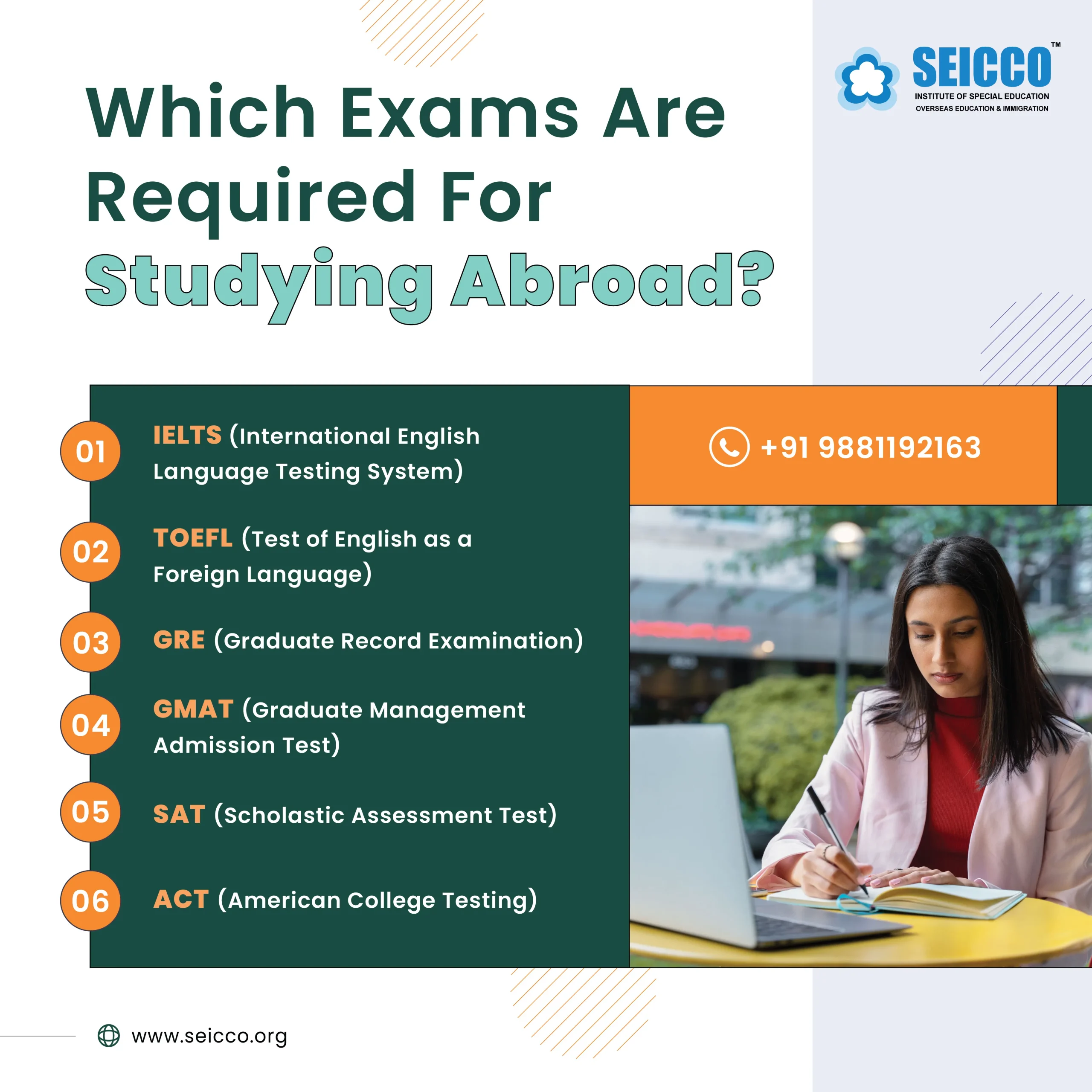Introduction
Embarking on a journey to study abroad is an exciting venture, but it comes with its fair share of challenges. One of the crucial steps in the process is conquering the standardized tests required for admission. Indian students, aspiring to pursue education overseas, encounter a diverse range of exams. In this comprehensive guide, we will delve into the intricacies of exams such as IELTS, TOEFL, GRE, GMAT and others shedding light on their significance and nuances.
IELTS (International English Language Testing System):
IELTS is a widely accepted English language proficiency test, assessing the ability of non-native speakers to communicate effectively in English. The test comprises four sections: Listening, Reading, Writing, and Speaking. IELTS scores are commonly required for admission into English-speaking universities, making it a crucial exam for Indian students.
TOEFL (Test of English as a Foreign Language):
Similar to IELTS, TOEFL is designed to measure the English language proficiency of non-native speakers. The exam evaluates Reading, Listening, Speaking, and Writing skills. TOEFL scores are often mandatory for admission to universities where English is the primary language of instruction.
GRE (Graduate Record Examination):
The GRE is a standardized test required for admission to graduate programs worldwide. It assesses analytical writing, verbal reasoning, and quantitative reasoning skills. Many universities, especially in the United States, use GRE scores as a key factor in their admission process for various postgraduate courses.
GMAT (Graduate Management Admission Test):
Specifically designed for students aspiring to pursue a Master’s in Business Administration (MBA), the GMAT evaluates analytical writing, integrated reasoning, quantitative, and verbal skills. GMAT scores are a crucial component of the application process for many top-tier business schools globally.
SAT (Scholastic Assessment Test):
Primarily taken by high school students, the SAT is a standardized test that measures mathematical proficiency, evidence-based reading, and writing skills. SAT scores are commonly required for undergraduate admissions, particularly in the United States.
LSAT (Law School Admission Test):
For those aiming to pursue a legal education, the LSAT is a critical examination. It assesses reading and verbal reasoning skills, crucial for success in law school. Many law schools in the United States and other countries require LSAT scores as part of their admission criteria.
ACT (American College Testing):
The ACT is another standardized test for undergraduate admissions, assessing English, math, reading, and science reasoning. While the SAT is more common on the East and West coasts of the United States, the ACT is widely accepted in the Midwest and South.
PTE (Pearson Test of English):
PTE is a computer-based English language proficiency test that evaluates listening, reading, speaking, and writing skills. It is accepted by various universities globally, making it a preferred choice for many Indian students aiming to study abroad.
MCAT (Medical College Admission Test):
Aspiring medical students need to tackle the MCAT, a standardized test that assesses biological and physical sciences, as well as critical analysis and reasoning skills. MCAT scores play a significant role in the admission process for medical schools, particularly in the United States and Canada.
CAEL (Canadian Academic English Language Assessment):
Designed specifically for students applying to Canadian universities, CAEL assesses proficiency in academic English language skills. It includes tasks related to reading, writing, listening, and speaking.
CPE (Certificate of Proficiency in English):
CPE is an English language qualification that demonstrates a high level of proficiency. Recognized globally, CPE is accepted by various universities as proof of advanced English language skills.
ECCE (Examination for the Certificate of Competency in English):
ECCE is an English language examination designed for high-intermediate to advanced learners. It is widely accepted by universities and employers to assess English language competency.
AP Exams (Advanced Placement Exams):
AP exams are subject-specific tests offered to high school students, allowing them to earn college credit for advanced coursework. While not always mandatory, AP exam scores can enhance a student’s application and provide an opportunity to demonstrate expertise in a particular subject.
Duolingo English Test:
Duolingo has emerged as an innovative option for testing English proficiency. The online test assesses reading, writing, listening, and speaking skills, providing a convenient and accessible alternative for many universities.
Application Procedure:
Research Exam Requirements:
Begin by researching and identifying the specific exams required for your desired study abroad program and institution. Different courses and universities may have varying exam prerequisites.
Create a Study Plan:
Develop a comprehensive study plan based on the exam format, content, and test dates. Allocate sufficient time for preparation, taking into account your strengths and weaknesses.
Register for Exams:
Visit the official websites of the respective exams and complete the registration process. Ensure you meet all deadlines, and provide accurate personal and academic information during registration.
Prepare Documentation:
Gather necessary documentation such as identification proof, educational transcripts, and passport details as required for exam registration. Verify the specific requirements for each exam.
Select Test Centers:
Choose a convenient and suitable test center for the exams. Be mindful of the location, available facilities, and exam date options to accommodate your schedule.
Payment of Fees:
Pay the examination fees through the official channels provided by the exam organizers. Some exams offer fee waivers or financial assistance programs, so explore these options if needed.
Prepare Effectively:
Utilize official study materials, practice tests, and any available preparatory courses to enhance your readiness for the exams. Establish a study routine and focus on strengthening areas where improvement is needed.
Review Test Day Guidelines:
Familiarize yourself with the rules and guidelines for the exam day. This includes permissible items, identification requirements, and any other specific instructions provided by the exam organizers.
Take the Exam:
Attend the exam on the scheduled date and time. Arrive well in advance, carrying the required identification and any permitted materials. Follow all instructions provided by exam proctors.
Receive Scores and Send Results:
Once exam results are available, access them through the official channels provided by the exam organizers. If required, send your scores directly to the universities or programs to which you are applying.
Remember to stay updated on any changes or updates to the exam procedures by regularly checking the official websites. Following these precise steps will help streamline the application process for studying abroad.
Choosing the Right Exams:
Research Scholarship Requirements:
Before starting the application process, carefully research the specific requirements of the scholarship programs you are interested in. Different scholarships may have distinct exam preferences.
Consider Your Field of Study:
Some scholarships may prioritize certain exams based on the field of study. For example, GRE or GMAT scores might be crucial for business-related scholarships, while TOEFL or IELTS scores may be emphasized for language-intensive programs.
Understand University Preferences:
Universities often have their own preferences when it comes to standardized exams. Check the admission requirements of the universities where you plan to apply for scholarships.
Preparing Strategically:
Plan Your Exam Timeline:
Create a timeline for taking the required exams well in advance of scholarship application deadlines. This allows you to retake exams if necessary and ensures that your scores are ready when you start applying.
Invest in Preparation Resources:
Utilize official study materials, practice exams, and preparatory courses to enhance your performance. Many standardized test providers offer resources to help you prepare effectively.
Seek Guidance:
If you’re unsure about which exams to take or how to prepare, seek guidance from mentors, teachers, or professionals who have experience in the field you’re interested in.
FAQs About Study Abroad Exams:
Which English proficiency test is widely accepted?
IELTS and TOEFL are widely accepted. The choice often depends on the requirements of the specific university or program.
Do all universities require GRE for admission to graduate programs?
No, not all universities require the GRE. Some programs may have different admission criteria or may not require a standardized test.
Can I take the TOEFL instead of IELTS?
In many cases, yes. However, it is essential to check the specific requirements of the universities or programs to which you are applying.
Is there a difference between SAT and ACT, and which one should I take?
Yes, there are differences in format and content. Some students may perform better on one over the other, so it’s advisable to take practice tests for both to determine which suits you best.
How important are standardized test scores in the admission process?
Standardized test scores are one of several factors considered in the admission process. The importance varies by institution and program.
Are there any exemptions from taking English proficiency tests?
Some universities may exempt students from English proficiency tests if they have completed their previous education in English or are from English-speaking countries.
Can I retake these exams if I am not satisfied with my scores?
Yes, most exams allow retakes. However, there are often restrictions on how frequently you can retake a test, so it’s essential to plan accordingly.
Do all medical schools require MCAT scores for admission?
While MCAT is commonly required for medical school admission in the United States and Canada, requirements can vary globally. It’s crucial to check the admission requirements of each medical school.
How can I prepare for these exams effectively?
Effective preparation involves understanding the format of the exam, practicing with sample questions, and utilizing study materials or preparatory courses. Time management and a consistent study schedule are also crucial.
Are there any financial assistance programs for exam fees?
Some organizations offer fee waivers or financial assistance for standardized tests. It’s advisable to check with the respective test providers for information on available assistance programs.
Conclusion:
Embarking on the journey to study abroad with a scholarship is a rewarding endeavor. Understanding the required exams is a crucial step in preparing a competitive application. Tailor your exam strategy to align with your field of study, scholarship requirements, and university preferences. With strategic planning, diligent preparation, and a clear understanding of your goals, you can navigate the standardized testing landscape and increase your chances of obtaining a free scholarship to study abroad. Remember, each exam is an opportunity to showcase your skills and qualifications, bringing you one step closer to your academic aspirations on an international stage. Good luck!







